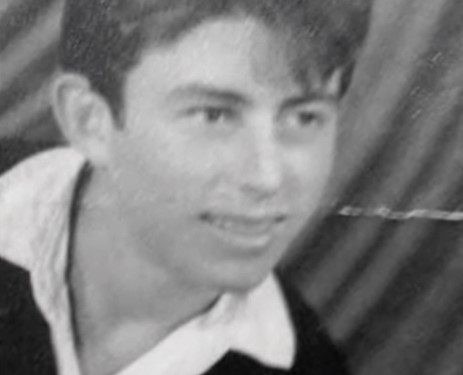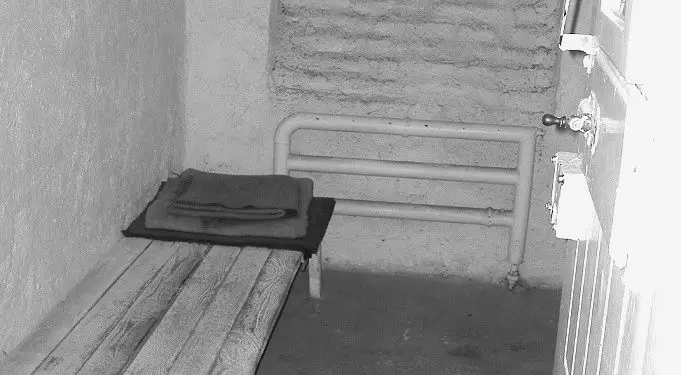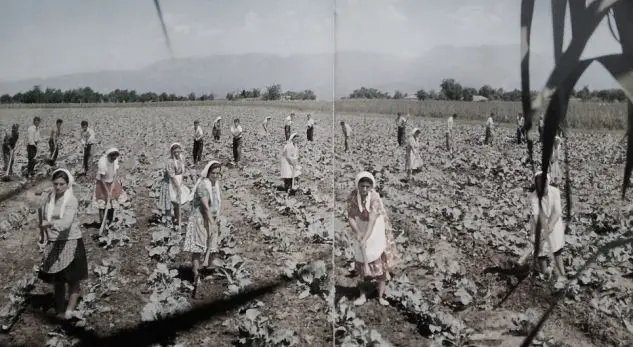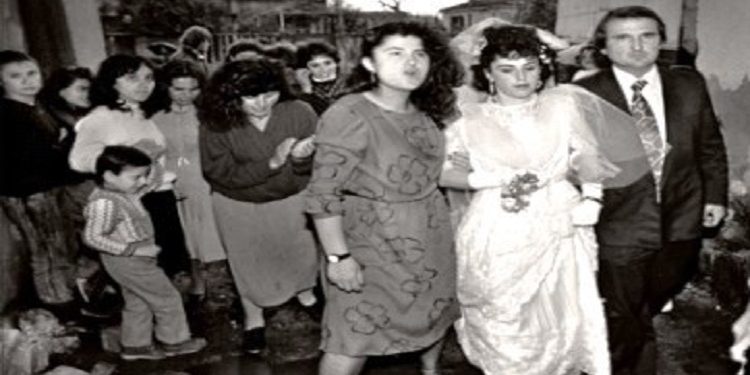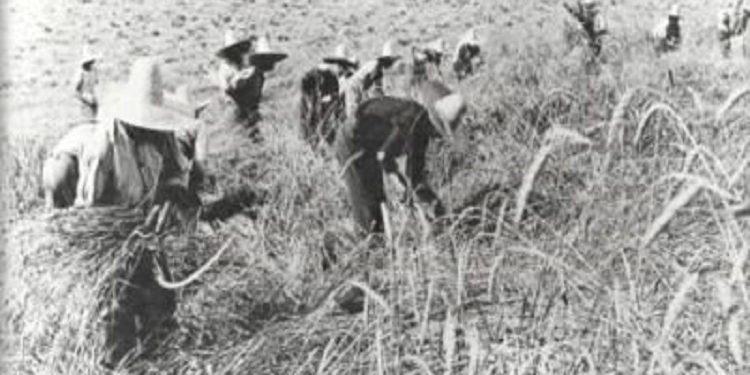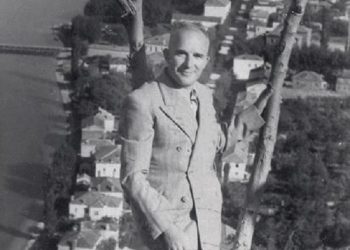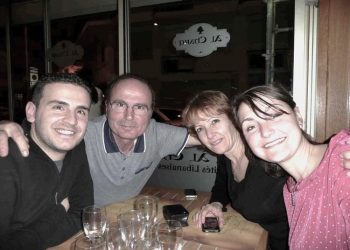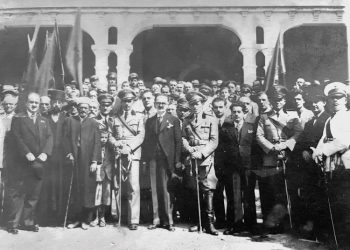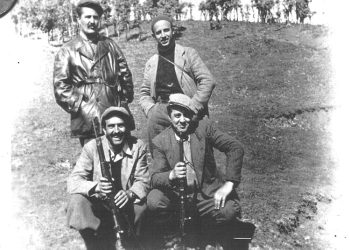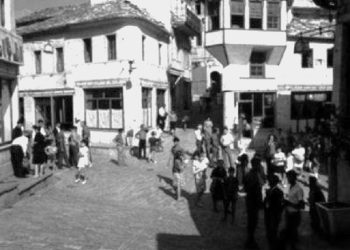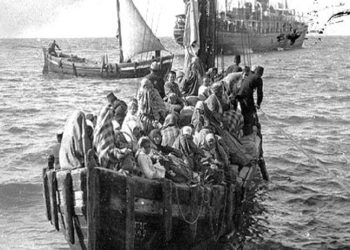By Shkëlqim ABAZI
Part Twenty-one
S P A Ç
The Grave of the Living
Tirana, 2018
(My memories and those of others)
Memorie.al /Now in my old age, I feel obliged to tell my truth, just as I lived it. To speak of the modest men, who never boasted of their deeds, and of others whose mouths the regime sealed, burying them in nameless pits. In no case do I presume to usurp the monopoly on truth or claim the laurels for an event where I was accidentally present, even though I desperately tried to help my friends, who tactfully and kindly deterred me: “Brother, open your eyes… don’t get involved… you only have two months and a little more left!” A worry that clung to me like an amulet, from the morning of May 21, 22, and 23, 1974, and even followed me in the months after, until I was released. Nevertheless, everything I saw and heard during those three days, I would not want to take to the grave.
Continued from the previous issue
In the early eighties, an event occurred in our district that shook the mentality of the time. The daughter of a cooperative chairman fell in love with a young man. Love blinded the youth, who fell into each other’s arms, without asking what race they belonged to, and she ultimately became a bride in the Gypsy tents. For the parents, it was worse than death; for the clan of the chairman, who also happened to be a deputy in the People’s Assembly (Parliament), it was a mark of shame. The unusual news spread far and wide.
The chairman-deputy’s comrades and friends dared not look him in the eye and could not find words of comfort. It took a joker to relieve the men of the region from their discomfort. At the regional feast, the chairman-deputy and the delegate of the Central Committee Bureau were leading the toasts. At the height of the merriment, when raki was flowing like a river and toasts for Enver, Marx, Engels, Lenin, Stalin, Zhivko (likely meant Zhivkov, but spelled differently), and all the known and unknown friends from around the world were passing from group to group, the joker raised his glass:
“Bottoms up, for our chairman-deputy!” The others froze, but he added: “Drink it, comrades, drink it, chairman!” He turned to the gloomy-faced man who stood frozen with the glass in his hand. “Smile a little, you sad sack, it’s not the end of the world to be so upset!” And he forced an idiotic smile: “It’s true the girl made a mistake, but there are worse things, my dear!”
Everyone was taken aback and awaited the reaction of the deputy-chairman, until a sycophant, seeing how hard it was for him to breathe, objected: “Worse than this? To take, with all due respect, an gypsy… excuse the expression!?”
“No, there is something worse!” the joker continued his point. “What if she had married a kulak (wealthy peasant/enemy of the people)? How would that have gone down? You would either break ties with your child or with the Party!” He tossed the stone, and the others continued the debate: “Is it right to break ties with the child, or with the Party, not like this and not like that.” It was unclear where they would end up, had the delegate of the Central Committee of the Party not intervened:
“Comrades, the fool, the fool, but he spoke appropriately! Very right, it couldn’t have been worse!” He supported the joker. “It would ruin the biography, and then try to fix it!”
“Better the gypsy than the kulak,” how beautifully he spun that ideal! The joker’s invention was enshrined in the golden fund (of wisdom/slogans).
Later on, the “monumental” quote was attributed to the Great One himself.
After some time, the chairman-deputy found a way, took the girl away, and married her off overnight, somewhere in the villages of Sulova, but the story surpassed the boundaries and its practical application spread throughout Albania.
“Better the gypsy than the kulak!
Better the gypsy than the kulak!
Better the gabel (derogatory term for Roma) than the kulak!
Better the Rom than the kulak!
Better the grave than the kul…!”
The term gypsy was used with all its synonyms; the quality “kulak” remained with the kulak, even though ninety-nine percent did not know the meaning or origin of the word.
“Who cared about the meaning or origin?”
“We have the Glorious Party of Labor of Albania for nothing!”
“Why should we worry?”
“Long live the Great One, who racks his brain for us too!”
“Glory! Glory! Three times Glory!”
“What the Party says, the people do! What the Party does, the people do! Hurray-a-a-a-a!”
“If the Party calls it cancer, leprosy, tuberculosis, plague, burst, hair, hell, gehenna, dump, sewer, cesspool, toilet, grave, beyond the grave, it must undoubtedly be so!” No matter which of these terms you used in a pejorative sense, you still couldn’t grasp the truth of the “kulak.”
Society was sharply divided, but the children of honest families stood by their relatives and faced the class war, married among themselves, or remained eternal bachelors.
It is easy to apply brainwashing to a terrorized people, to the point of threatening existence, to the point of genetic disappearance, to the point of manipulating truth, to the point of erasing epochs, to the point of dementia. From the very beginning, the Bolshevik-Chekist propaganda eliminated the intellectual elite and launched the ideological offensive; they defiled the fathers of the nation, with the diabolical method of contaminating collective amnesia, they manipulated history, smeared nationally renowned writers and poets, confiscated and destroyed irreplaceable museum, cultural, religious, and secular values, and scornfully abused the bearers of the Canon (Kanun), of honor, and of the proverbial Albanian pledge (besa).
The class war produced needless casualties between social groups and unnecessary hostility. A generation of the brainwashed was growing, a product of the devilish effects of the class war that infected the cells of the public organism, indoctrinated even infants in the cradle, until the moment arrived where no one dared to think with their own brain.
Whoever went against the current was declared an enemy with pronounced state and public dangerousness and, as such, was separated from the group and crucified as bourgeois conspirators, supposedly to protect them from the expansion and infection of ideological, capitalist-revisionist bacilli.
Culture was declared non grata, art, literature, education, and science were cursed, a limit was placed on every Western movement; meanwhile, they welcomed the storms of the Russian steppes and then of the Far East, which, along with the ideology, brought moral decay, spiritual decadence, and devalued inherited customs and traditions. Whoever doubted the new method faced class venom, moral denigration, verbal, psychological, and physical violence, legal harshness, prison, destruction, or the luckiest ones, banishment to psychiatric hospitals, where they were isolated as madmen. Even if they were not mad, they were driven mad by the brainwashed doctors, who left no experiment untried on the resistance of the human psyche, using all sorts of communist psycho-pathological methods of cure.
No one enjoyed immunity except The One; the wrath of the class war scorched anyone who ended up in the experimental laboratories of power. They turned the people into guinea pigs. Doctors replaced science with suggestion, practiced social therapy, recommending patients with psychoses to study Marxist-Leninist literature and the works of the paranoid leader, either privately or collectively; moreover, to achieve the maximum efficiency of this perverse therapy, they replaced prophylactic vaccination with forms of communist education, with the gymnastics of feelings and the brain; they organized collective marches from dawn till dusk, despite being hungry, collective studies, supposedly “voluntary” with beatings, of the dictator’s works.
They gathered pupils in schools, students in auditoriums, military personnel in barracks, workers in enterprises, and cooperativists in hangars, even children in nurseries and pensioners in the corners of socialist emulation, and forced them to follow the roars of the Great One on the radio, television, or in newspapers. While all medication was missing, they propagated suggestive therapy—in a word, they practiced brainwashing!
The entire “intellectual elite” of the Academy of Sciences of Socialist Albania was put in the service of propaganda, pouring their talent into collective brainwashing, filling thousands of hours of radio or television programs with news and interviews of miserable people pretending to be happy; producing thousands of linear meters of films with positive heroes who had to look joyful when giving their lives for the Party and Comrade Enver, to be declared victorious even in death; writing tens of thousands of tons of books where the bourgeois “lunatics” had to be presented as immoral, ignorant, murderers, savages, executioners, bloodsuckers, etc., and the “good secretary” as proud; in the art galleries, they unveiled several thousand square meters of paintings with pencil, ink, tempera, watercolor, oil paints, etc.
With giant revolutionaries and Lilliputian giants; they filled city parks and village corners with monuments, busts, and bas-reliefs, where the partisan died with his fist raised and the ballist (anti-communist) trembled with fear; finally, after publishing dissertations with exhaustive studies on the triumph of socialist realism and the failure of surrealism and bourgeois isms in the magazines “Hosteni,” “Nëntori,” “Shkenca dhe Jeta,” etc., they were provided with scientific titles and degrees, but only after having thoroughly studied and mastered the seventy works of Enver and other Marxist-Leninists.
The therapeutical-prophylactic-brainwashing practice began with the conception of the fetus in the abdomen, continued in the mother’s womb, which transmitted the Party’s blood through the umbilical cord to the fetus’s pituitary gland, and when the infant came into God’s light and fell into the social swamp, the blood supply continued to feed the brain and heart with Enver’s works.
The biological-social nourishment did not end with growth and aging, nor even when one closed their eyes, because one had to die happy and proud, having contributed to the collective brainwashing. The socialist Big Brother found a perfect field in Albanian society, spreading so quickly that even the clever Orwell with his Animal Farm would have envied it. Generations of the brainwashed begot other brainwashed, and these others, and others, until the triumph of collective brainwashing; this explains the tears poured in streams over the dictator’s corpse and the denial of everything and everyone declared against the current.
Two clients joined us!
“How are you, Rremo?” I addressed the elderly man.
“And you, my son?”
“Well, thank you!”
“Were you with my Lika?” he asked, surprised.
“I didn’t know he was yours!”
“He was my brother!”
“I know now!”
We somehow got past the moment.
“My son-in-law, Faik!” he introduced the other one.
“I figured that much!”
“He’s the eldest, I have three others too!”
“Glad to meet you!” I extended my hand.
“Muharrem, why didn’t you show up all these years!” Sela intervened.
“Fear, son, fear!”
“What fear, man, a brother is a brother, but you are rabbits!” he burst out angrily.
“We had children, Selo!”
“Didn’t they have any?” the other retorted, pointing at me.
“They were taken by fate (peropia), and I was a partisan and…”!
“What did you gain from being a partisan, you wretch? You got scabies (zholi)!” and he shook his thumb.
“He-e-eh!” the old man sighed deeply.
“You lost your property, your wealth, your land, your livestock, your brother, your nephews, your nieces…”!
“Yes, unfortunately!”
“You were left with the thistle (hosteni) behind the tails of horses and oxen!”
“What can we do, Selo, this was our lot!”
“The past doesn’t come back, let’s look ahead!” I intervened, because once Sela started, there was no telling where he would end up.
“That’s right, we must fix what can be fixed!”
He vented until the waiter brought the order, took the cup, and wished:
“May what God has given you live long!”
“Thank you! We are meeting today for an important matter.”
“What is more important than family?” Muharrem replied.
“Nothing! – Sela affirmed. – But we are gathered for yours, because you don’t have everyone!”
“Thank God, I have the full number!”
“Where is your brother?”
“Near the great God!”
“Indeed, his soul is near God and Abas Ali, but his bones are lost, without a name or a trace!”
“It was the time, brother! He fell into prison and we parted while alive, then he was lost like an axe without a handle, in internment!”
“Lost or didn’t you look for him?!”
“To be honest, I found out late.”
“And his children?” I intervened!
“They scattered like crow’s fledglings after their mother’s death, one here, the other there.”
“Because no one supported them!?” the villager accused him.
“Please, don’t scratch my wounds!” a tear escaped his eyelashes and rolled down the deep furrows.
“Muharrem, where are his children?” I asked to change the subject.
“One son has died, a couple are lost in exile. He has one daughter left in Elbasan.”
“How can we contact her?”
“I’ll try to find them!”
“No problem, I will talk to Mit’hat!” Faik, who had only been listening until then, intervened.
“Who is Mit’hat?” Sela asked.
“The husband of my niece!” the old man clarified.
“A police officer will guide us to find the remains, I would like the close relatives to be present.”
“Who is closer than me? I am his brother!” Muharrem jumped up. –
“Let’s leave today!”
“Where?”
“To Malinat!”
“I will speak with the officer to set the day, but it would be best if his children were also present,” I concluded. I paid and we parted.
The next day, I told I. about the meeting with Ali’s brother.
“I’m ready to leave even tonight!” the officer expressed enthusiasm.
“I don’t doubt your readiness!” I replied.
“It’s not a matter of will, but as soon as I lay my head on the pillow, my ears roar and dreams attack me.”
“Calm down!” I advised him.
“Easy to say, but put yourself in my shoes!”
“We will leave as soon as his family members arrive.”
Two days later, I was called from the bottom of the stairs.
“Come in!” It was an elderly couple.
“We have some business with you!” the man spoke.
“I’m listening!” I thought they were just troubled people knocking on my office.
“It shouldn’t be discussed from the end of the street.”
“Are you Shkëlqim Abazi?” the man asked.
“Yes!”
“We’ll wait for you downstairs!” and they headed down.
Across the road, a group of six or seven people looked at me intently. I recognized Muharrem and the elderly couple who had stood at my doorstep a few minutes ago.
“They are from Elbasan!” Muharrem introduced them to me.
“I am Ali Hoxhallari’s son-in-law!” the elderly man introduced himself – “This is my wife, and these are my sons!”
We went into the six-story building and ordered coffee.
“Are you Ali’s daughter?” I addressed the woman.
“I am, the wretched one!”
She seemed to be the same age as my mother; perhaps the Sulova attire made her look older.
“Where do you live?” I turned to her husband.
“In Sulova, but the children have moved abroad and don’t wish to return to the village.”
“Normal, they want a better life!” I supported the boys’ idea to settle elsewhere.
“Are these all you have?”
“We have six, the older ones are in Greece, two married daughters, these are our late-age children!”
“They are twins!” the wife added.
“May they live long, may you have them for life!”
“Thank you!”
“What about you, what children do you have?”
“I answered him.”
“This is Ali’s friend!” Sela got to the point.
“May you be honored! Where did you meet my father?”
“In prison!”
“Woe to my father, his life was spent in prisons and internments!” the woman sighed.
“You had an honest father; one you should be proud of!” I added.
“His life went to pure hell; he didn’t see a single day of peace!” the man lamented.
“An officer knows the location; I think we should act before the rains start.”
“Let’s leave today!” one of the twins jumped in.
“We can’t without the officer.”
“So, what shall we do?” Muharrem asked.
“Tomorrow!” I decided.
“Good, where will we meet?” Sela asked.
“If you wish, you can sleep at my place!” I invited them. Memorie.al




